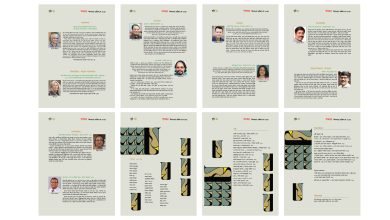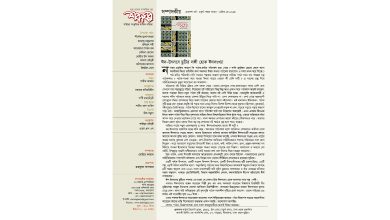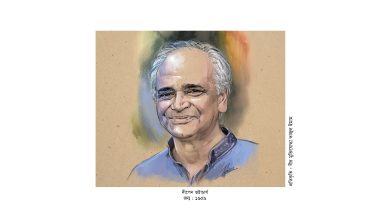Story : Friend : Mohit Kamal
Translated from the Bengali into English by Alamgir Mohammad
Immediately after sensing a touch on her forehead, Medha wakes up. Her name suggests her brilliance, but she is brilliant in her study too. Even though it’s time to prepare for school, she doesn’t wake up.
‘Won’t you go school, Medha?’ Hearing Mother’s query, she closes her eyes again. She doesn’t say anything in response. Moving herself a bit, she keeps lying holding the pillow.
Her mother, Urmila Chowdhury, suddenly feels worried. Seeing her daughter’s inattentiveness to school, she feels a pressure in her chest. With this pain, she opens up the window. She places the curtain of the window aside and turning it up from the outside view she again looks at the cot. Daylight enters the room, but her daughter remains unmoved.
Controlling her pent-up worry, Urmila Chowdhury calls out yet again, ‘Medha, see how shiny the day is! The school bus has come and the children are hurrying up towards school!’
Awaking with a sudden jump and shouting at her mother, Medha says, ‘Get out, get out from my room.’
Urmila Chowdhury becomes dumbfounded. With a helpless look, she looks at the topsy-turvy cot of her daughter. A look at the window; soft sunshine is flooding the cot, the light falling on Medha’s face too. Yet she doesn’t leave the bed. She still continues to sleep as before. Let her please herself. It seems she did not sleep at night, perhaps in the late hours she fell asleep.
Coming to the dining table for breakfast, Suman Chowdhury finds the table neat and clean and arranged. Removing the shade of the plate, he finds fresh parathas and omelette. Fried vegetables on one side, fried beef on the other. Seeing his favorite dishes, Suman assumes that the homemaker is in a good mood today. Seeing Urmila coming out from the daughter’s room, he says, ‘Bah! It seems the quarrel between mother and daughter is over. Misunderstanding too!’
Urmila Chowdhury remains silent and Suman Chowdhury doesn’t feel to look at his wife’s face, not even mistakenly. Immediately after the question, he says again, ‘The smell of beef has aroused my appetite. Won’t any of you sit to eat?’ No reply this time either! Even after getting no reply, he doesn’t look at his wife’s face. Rather, taking the plate to eat, he keeps saying, ‘I have got to hurry today, I am having breakfast. I have to go out. You and Medha take can have it later. Then the enmity between you and her will come to an end, friendship will grow up.’
The plate arranged with breakfast has suddenly flown away and fallen on the next wall. Parathas and fried beef get scattered here and there. Flinging everything away with her hands, Urmila Chowdhury gets into her room and closes the door from inside.
Suman Chowdhury gets astounded. Failing to realize the reason for her heated temper, he assumes probably the conflict between the mother and the daughter has augmented to an extreme point. He remains silent assuming that it is normal from a mother who is engrossed in thinking good of her daughter. He is about to go out without having breakfast but turns back. He doesn’t enter his daughter’s room ever. Yet, he knocks at her door twice and stays before the door.
He doesn’t have to wait for long; the door opens within thirty seconds. With a sleeping appearance, Medha says, ‘The door is open, Bapi!’
‘Oh! I am sorry. Have you just woken up?’
‘No, I woke up a while ago. Ma has awakened me.’ Medha replies in a calm voice. Hearing the pattern of knocking at the door, she realized well that it was not her mother. Ma usually doesn’t knock at the door; rather, she pushes it if it is closed. Or, she enters her room without any permission. ‘Read’, ‘read’, ‘go to school’, ‘go to coaching’, and ‘read to your house tutor’ are the common commands that she usually hears from her mother, nothing else. Thus she cannot bear the presence of her mother. Yet, despite hearing knocks at the door for several times, she is talking in a cool voice. She forgets how she behaved with her mother a while ago.
Now Suman Chowdhury looks at his daughter’s face. Seeing her sleepy face, in no way did he understand how she behaved with her mother a while ago. Rather, this time he looks at the open window of her room. He sees daylight flooded and realizes the sun is much up already. Medha did not go to school. Urmila has gone angry thus probably. He cannot blame her anymore.
With weary eyes, Sumon stands outside the closes door, and then turned to look outside through the open window. Thoughts once again entangle his mind like a web of spiders. In his home, there are two windows in two different directions, but one window would suffice. Yet, the windows, he thinks, do not seem to open. They are shut, veiled by spider-web.
In the midst of his turmoil, the spiders play on the window pane, as if in a mournful lament. In their troubled sorrow, the windows never seem to open; they remain locked, preserving their secrets. Inside, the air is still, heavy with the ambience of solitude.
In such an environment, how does one immerse themselves, find solace, or unlock the mysteries within? Suman ponders over these questions but finds no answers. Instead, he gently places his hand on her head and whispers, “Have your breakfast, go to school. I am leaving.”
Medha, with her innocence intact, replies softly, “Alright.”
Suman doesn’t utter a harsh word, nor does he insist further. After leaving the room and locking the door behind him, he reclines on his cot.
Two
After receiving the letter, Urmila Chowdhury remains dumbfounded. A letter has been sent to them from Medha’s school authority. Headmaster has requested her parents to meet at the office. Medha is accused of four issues: first, she has failed in three subjects; second, she is irregular at school; third, she brings a smartphone to school secretly and shows some unethical websites to other girls; she is not only losing her morals but also causing wrongs to other girls; and, finally, she doesn’t care any rules and regulations of the school – she is indeed going unruly and reckless day by day.
Except the maidservant, no one else is at home, so Urmila Chowdhury now feels stifled. The stifling heat seemed to imprison her, and she’s feeling to wet her forehead with cold water. She’s feeling as though the pressure increased, not only in her chest but also in her soul. An unexplainable discomfort gnaws at her, and though it wasn’t physical pain; it weighs heavily on her heart.
Within her, she feels as if a thousand silent, crumbling pillars took root, creating a fortress of despair. Even in her own existence, she senses a fracture. She thinks shedding tears might bring some relief.
‘Maricha! Maricha!’ Urmila calls out to the house governess.
‘Yes, Madam. What can I do for you?’ Afia replies.
‘Give me some cold water from the fridge.’
‘Is something wrong with your health, Madam?’
‘Yes, my head aches a bit. Can you give me a little massage?’
Though Afia may understand the word ‘massage’ clearly, she grasps the implied meaning and agrees to soothe Urmila’s head. She quickly brings cold water and tells her, ‘Sit down here, and I’ll gently massage your head.’
Urmila Choudhury meticulously follows Maricha, finding solace in the momentary relief. After some respite, her thoughts wander to the day of her daughter’s primary school examination results. Medha achieved outstanding results in all subjects, securing an A+ with distinction, both in her final primary and junior school certificate exams. Scholarships was awarded. Her daughter’s achievements filled her with pride, but it also added to the weight of her expectations.
‘Maricha.’
‘Yes, Madam.’
‘Please turn up the fan a bit.’
‘Now generator is running, Madam. Otherwise, I would have turned on the AC.’
‘That’s fine. Do your own work and let me keep alone.’
‘Madam, is something bothering you? Should I inform the family members?’
‘No,’ Urmila replies with a strained voice.
Though she doesn’t speak aloud, deep inside, she longs for her husband’s presence. She wishes he’ll be by her side. When he was around, Urmila found peace. Unspoken, this yearning seeps into her thoughts as a silent, obedient companion.
‘Maricha.’
‘Yes, Madam.’
‘Maybe adjust the fan a bit more.’
‘Sure, Madam. The generator is running, so it’s not an issue now. Otherwise, I would switch on the AC.”
Urmila sits alone in her thoughts, while the invisible shackles around her feet seem to have grown tighter. Her right foot would never come forward again; it feels as if life’s embers were flying towards her, ready to engulf her. As she gazes at the burning coal, her existence feels meaningless. The fire burns relentlessly, and she seems to dance within its flames. Her life now resembles a heap of meaningless ashes, devoid of any purpose.
The family’s provider, the husband, and the children, all are without purpose in her perception. Yet, nothing feels devoid of purpose within her. Every act, every word, she knows, holds significance. Even in the midst of her thoughts, she senses that her feet will never step forward again, but she doesn’t despair. She embraces the flames and dances.
‘Maricha, go back to the kitchen.’
‘Ok, Madam.’
Three
Urmila Chowdhury thinks she will take time to share the school incidents with her husband gradually. Moreover, she is a bit repentant for her misbehavior with him. The situation is still volatile at home. With a touch of anger, pique and sadness in mind she has been waiting for her husband. Today is Sunday. On Tuesday they will have to go to school. Both parents are cordially requested to meet the school authority. Though the language of the request is decent, the tone of accusation is unexpected. Urmila has been thinking of sharing it with her husband and comes out of her room to meet him. At this moment she meets Medha at the dining table. She looks much jolly today. She seems very easy and cheerful too. It seems she is not capable of thinking that such an accusation might come against her from the school. Urmila thinks as such. She stands still before her daughter. She finds her daughter unmoved and carefree.
‘When will Bapi return, Mamoni?’ The tone of the girl’s voice, as she poses this question, carries no unnatural inflection. She knows she had to give a reply, butfor failing to do so might unleash a fearsome tempest. By now, her demeanour is well-acquainted with the routine of these exchanges. Upon hearing the question, Urmila Choudhury, who already engaged in a silent battle with her own conscience, responds promptly, ‘He won’t be back before evening.’
‘Ok. Listen, today a friend of mine will visit our home. We’ll talk until the evening. Prepare some roasted khichuri and beef curry for us, and send it to my room.’
Urmila Chowdhury wanted to ask why she doesn’t eat at the dining table, why she can’t just sit and have her meal, but she refrains. She quietly absorbs her daughter’s words. She didn’t fully forget the school incident – the complaint from the school. She wonders if something went wrong in her daughter’s life. Her mind hints at a misplaced letter from school or perhaps from someone else’s house. These suspicions prompt her to respond hesitantly, ‘Alright.’
Something extraordinary occurrs. Upon hearing her daughter’s casual request, Urmila’s mental storm seems to abate. She feels strangely at ease with her daughter’s request. She knows that her daughter prefers the dish she is preparing – ‘roasted khichuri’ and ‘beef curry.’ She can’t refuse. She enters the kitchen.
Begum Sahiba, the house governess, observes Maricha’s acts and thinks she looks relaxed. She is efficiently assisting in the kitchen work. They work in harmony, finishing all the cooking together. Urmila Chowdhury takes charge of the main dishes. In this arrangement, everything flows smoothly. She invested her maternal love into this preparation. She could prepar the same dishes for her daughter if she asked. The thought of the school complaint doesn’t cross her mind in the quiet of the kitchen.
‘Maricha Khala,’ Medha calls, and the house governess responds promptly.
‘Where’s Mamoni?’
‘She’s her room, will take a shower now.’
‘Okay, you can leave. Bring our food to my room.’
‘Oh, is your guest here?”
‘Yes.’
‘Where is she? I haven’t seen her.’
‘You don’t need to see her. She’s in the washroom. Just bring our food to the room.’
Maricha leaves for the kitchen. She quickly arranges all the dishes on a trolley. It is the same meal for both of them. Then, she goes to Medha’s room with the trolley.
Maricha can’t help but wonder why Medha chooses to eat separately in her room. She can’t understand anything; she didn’t see anyone coming to the house. Is it then a ghost, or djin or anything else? She begins to fear. Is Medha Mamoni is disturbed; why then she has taken meals for two persons? Maricha feels astounded about all this.
Four
After the shower, Urmila enters the kitchen and finds Maricha dumbfounded. ‘What’s happened, Maricha’, asks Urmila Chowdhury. Why do you look disturbed?’
Maricha tells her everything in detail and remains silent. Yet, Urmila Chowdhury enquires, ‘Have you seen the guest?’
‘No, Apa said she’s is in the washroom.’
Haven’t you seen her while entering our house?’
‘No.’
‘Okay, leave it. Don’t think about it. Probably, you have been in the kitchen and I in the washroom. I think she came then.’
‘Yes, Madam, it might be so.’
Although Maricha’s thought are simple, Urmila Chowdhury is still restless. Shouldn’t she have minimum courtesy? Shouldn’t she feel it necessary to introduce her friends to her mother? Having food in the closed room individually is not indecent! As her mother is at home, won’t she maintain minimum courtesy? She once moves to the closed door. Holding the door handle she realizes the door is locked inside. She returns silently and feels her long cherished and nourished daughter is not hers now.
She has given her house help the status of ‘House Governess’. Yet, it seems she is given minimum respect by her daughter. When friends of her daughter will come home, it would be a matter of much happiness at home. She will involve her mother in their enjoyment! Instead of doing so, she is doing chit-chat with her friends locking the door from inside! What kind of secrecy it is! Her thoughts become haphazard. She feels hurt and insulted by such behavior by her daughter Urmila Chowdhury keeps seated at the entrance of her house. She expects her daughter to introduce her to her friends. She wishes to join them in happiness.
After about two hours her worries end. Her daughter opens her door. Medha finds her mother sitting at the door of her room. She stumbles in a way but in a jiffy, she tries to be natural and talks to her mother, ‘Mamoni, come. Let me introduce him to you. He is my friend.’ After saying this she calls the boy from inside, ‘Hey, come and be introduced to my mother.’ Urmila Chowdhury notices a young man in good health coming out from Medha’s room. He has a scattered beard on his face. In a milder way he exchanges greetings, ‘Good afternoon, Aunty! How are you? I am Aniket, a very close friend of Medha.’
Mohit Kamal : Fictionist in Bangla Literature
Alamgir Mohammad : The Translator teaches at the department of English, Bangladesh Army International University of Science and Technology, Cumilla.
Illustration : Rajat




